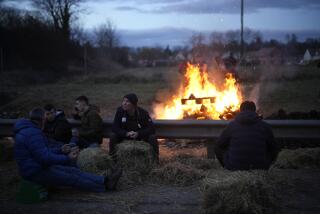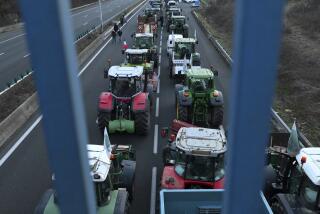Rural Protest Draws 400,000 to London
- Share via
LONDON — In one of the biggest anti-government demonstrations ever held here, more than 400,000 rural Britons marched Sunday to protest what they called official neglect and misunderstanding of country life.
Labeled “Liberty and Livelihood,” the march was organized by the Countryside Alliance, an umbrella movement representing myriad groups of rural protesters. It focused on a string of problems that country dwellers say have been eroding their way of life.
Although the catalyst for the rally was a proposed ban on fox hunting, already announced by Prime Minister Tony Blair, the demonstrators’ complaints ranged from the steep decline in many farmers’ income since the outbreaks of “mad cow” and foot-and-mouth disease in Britain to a lack of social services in the countryside. Some said the confluence of rising housing prices and government building projects threatens to destroy rural communities.
The demonstrators, who came from throughout Britain, were joined by supporters from the U.S., Australia, New Zealand and elsewhere in Europe to form a dense throng that snaked through central London toward Whitehall, the street lined with government buildings.
Participants wound up in Parliament Square, where an electronic counting system had clocked a total of more than 407,000 by 6 p.m.
Many protesters arrived after overnight journeys by road and rail, and there was a predominance of the sludge-green weatherproof jackets and tweedy garments worn in the British countryside as marchers strode down Piccadilly, normally the reserve of tourists and shoppers. They tended to represent the “Liberty” quota of the march, and most had the air of landed gentry.
Among the “Livelihood” contingent, by contrast, work clothes or jeans and sneakers marked the farmers, gamekeepers, independent country dwellers and workers from cottage and rural industries.
One of them, Paul Larby, said he has been a professional huntsman for 28 years but foresees his livelihood disappearing.
“My house goes with the job. I have two sons. I’ve watched the erosion of the countryside under successive governments who have never understood it or how it works,” he said.
William and Ann Brown, who have three young children, farm 1,000 acres in Wiltshire in the west of England.
“The prices we get for our produce--beef, lamb, cereals--are totally unrelated to what it is sold for to the consumer,” Ann Brown said.
“We sell barley for 50 pounds [about $75] a ton now instead of 101 pounds of two years ago,” said Jenny Higgins of her family farm’s produce in Shropshire, to the north.
Indeed, figures distributed by the Countryside Alliance show farm incomes 71% lower than in 1995, with arable farm incomes down by more than 90%. To this, the organization adds the stark reality that the average age of Britain’s farmers is now 58.
A number of city dwellers, or townies, also turned out Sunday in sympathy with their rural brethren. Bearing the banner “City of Westminster” was John Ong, a banker from Ohio and a Londoner for the last 12 years.
“I think it’s catastrophic that English country life should feel so threatened,” he said. “For Americans, England is the country that epitomizes rural life.”
Another American, Russell Clarke, who chairs the U.S. chapter of the Countryside Alliance, was “totally in agreement with everything that is being protested about today. We [hunters] are trying to keep a balance, not trying to annihilate a species.”
The right of rural people to live their lives in the way they choose, and respect for the values and customs of rural communities--which would include safeguards against prejudiced attacks on hunting and field sports--were among five points the Countryside Alliance listed as matters to be pursued with the government after the protest.
“This is not so much a protest between town and country. It’s the countryside against parliamentary indifference,” Countryside Alliance chief executive Richard Burge said before the march.
Rural Britons, he said, are “a minority community that feels disenfranchised, unloved and fearful. It doesn’t feel that democracy through the ballot box is representing country interests.”
A slew of new regulations since Britain’s bouts of “mad cow” and foot-and-mouth disease has meant that farmers are not only underpaid but overburdened by bureaucracy, Burge said.
John Jackson, the movement’s chairman and author of the march’s slogan, said Sunday evening: “Anybody who thinks this is just about hunting must be living on another planet.”
More to Read
Sign up for Essential California
The most important California stories and recommendations in your inbox every morning.
You may occasionally receive promotional content from the Los Angeles Times.













